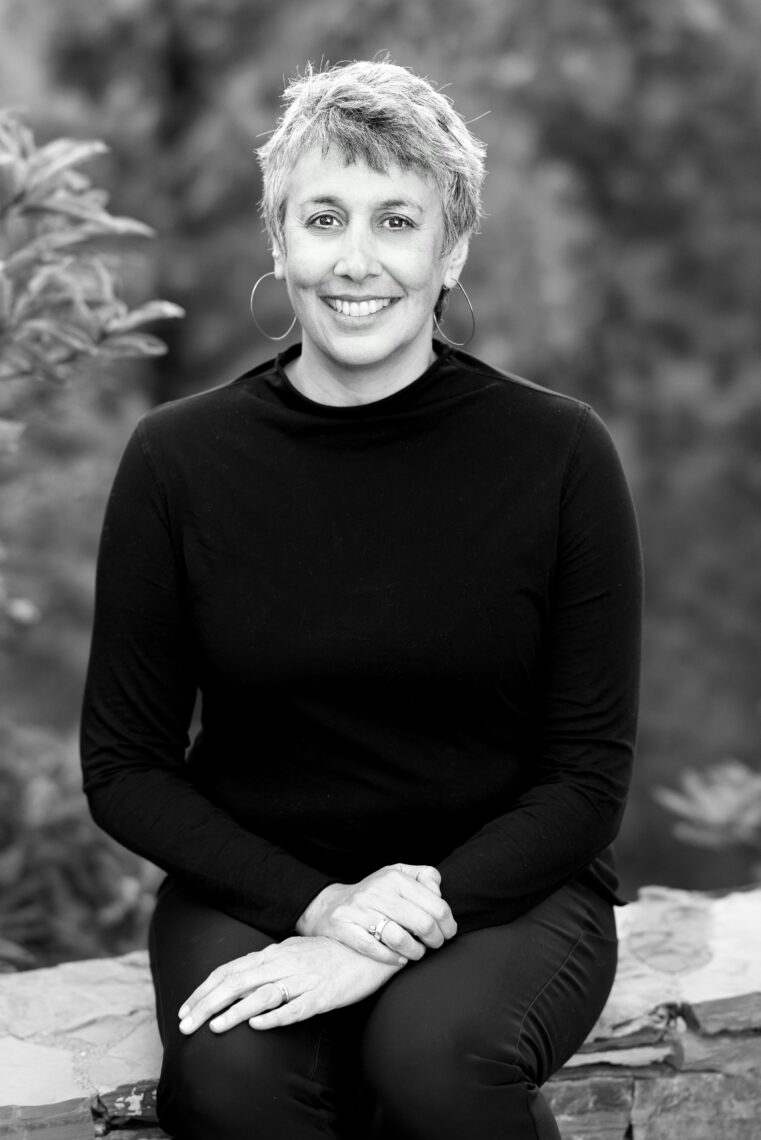
Geeta Anand. Photo by Christopher Michel.
Dear Berkeley Journalism Community,
We live in a moment like no other. The threats to democratic culture posed by weaponized disinformation, partisan disharmony, and rising authoritarianism driven by advances in technology show no sign of abating. And the traditional media system has yet to fully grapple with how our changing world requires a very different kind of journalism, one that has the strength to respond to these new threats while hewing closely to the fundamental ethics and time-tested practices that reflect the best in our profession.
The threats are profound. In a recent Washington Post column, the Shorenstein Center’s Nancy Gibbs listed the consequences of this crisis on democratic culture and practice – not only inside the Beltway but also in communities across the nation. “Since 2005,” Gibbs writes, “newspaper employment has fallen 70 percent, and local TV, radio and new digital start-ups don’t begin to make up for that decline. Fewer knowledgeable local reporters … means less accountability, leading to higher public spending, lower social cohesion, fewer people voting or running for office, less ticket-splitting and more polarization as people rely on national news sources. In 1992, a third of the states with Senate races picked a senator from one party and the president from the other. In 2016, not a single state did so, and that hadn’t happened in 100 years.”
But as those of you able to attend the class of 2023 spring showcase events well know, this isn’t just a time of crisis but a dawning era of innovation within our field. We see it all around us – in the stunning growth of nonprofit journalism, for instance; the successful transition of some legacy media outlets (primarily serving national or specialized niche audiences) from print to digital; the generational change in how and where users get their news; and the development of new centers of excellence of journalistic practice, sustainable enterprise and community engagement.
The role of journalists and the core mission of our school have not changed. We exist to safeguard the truth. As bulwarks against the pernicious influence of fake news propagated by bad actors. To make the truth accessible and reflective of the lived experience of all people at a time when facts are in competition with fiction.
This is a crucial moment for Berkeley Journalism – a pivotal time for us to strengthen the bonds of trust and credibility in our profession by bringing new voices, new leaders and new cultural competencies to the field.
To this end, over the past year, I worked with our faculty, staff, students and advisory board to develop a new, comprehensive strategic vision for Berkeley Journalism, one that will guide our way forward for the next several years. It puts into practice the goals we’ve set for ourselves: to give our students the best journalism education in the world, to change the rules of who gets to be a journalist, and to foster journalism that makes a difference in our students’ lives and on this planet.
We have made great progress in designing a special Campaign for Berkeley Journalism to raise the funds needed to make this strategic vision a reality. The campaign envisions raising funds to address the fundamental issue of affordability – which is at the heart of our work to strengthen journalism and open up our profession to those who better represent the rich diversity of this world. At the same time, we aim to support and expand the School’s core professional development programs, invest in new programs like climate change, data and business journalism, and address the challenges (and opportunities) posed by disinformation and AI technologies.
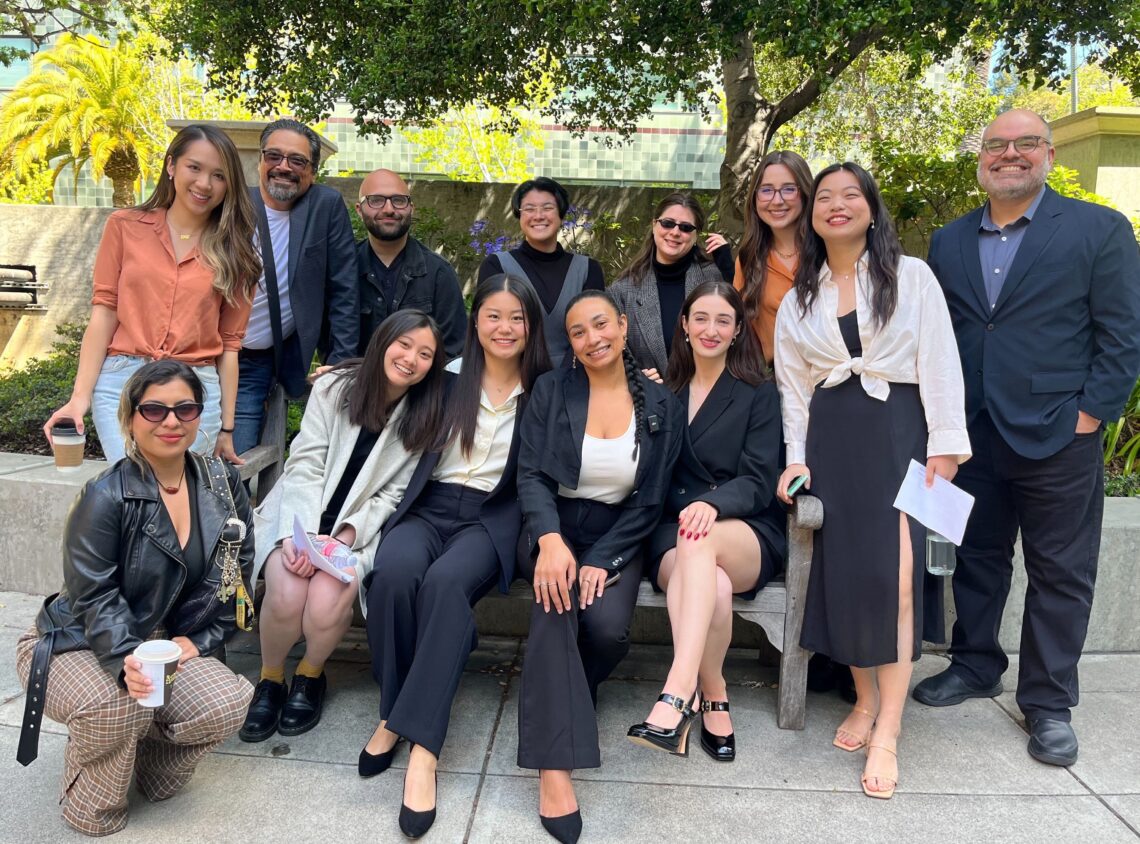
The Class of 2023’s Multimedia Showcase, May 11, 2023.
New professor to transform climate change journalism
I’m thrilled to share that we have hired the documentary filmmaker, journalist and media industry trailblazer Jason Spingarn-Koff as our new professor and Knight Chair of Climate Journalism.
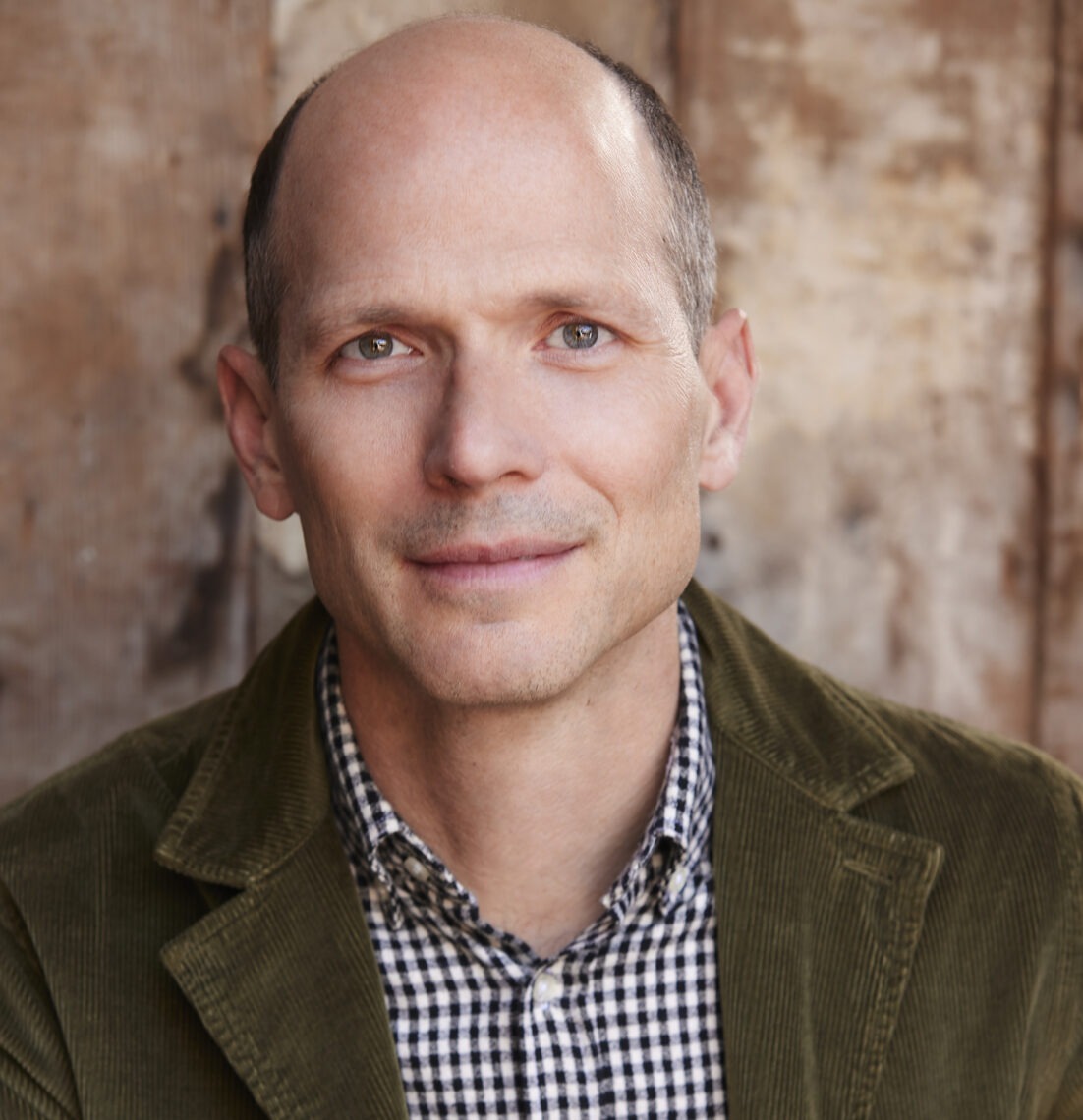
Jason Spingarn-Koff
Jason is charged with turning our school into a center for reinventing how stories about climate change are told. He will work with me and David Ackerly, dean of the Rausser College of Natural Resources, to unite the brainpower of top science experts on campus with the expertise at the journalism school to collaboratively publish stories. He will forge partnerships with media outlets to publish projects produced in these campus collaborations in traditional and new media forms. The goal is to have an impact on public understanding of climate change.
Jason (’01) most recently spent seven years as director of original documentary programming at Netflix, where he played key roles in bringing to broad audiences many iconic documentaries that have transformed public perceptions of the natural world and our role in preserving it. Before that, he launched and oversaw the pioneering Op-Docs initiative at The New York Times that is credited with transforming the media landscape for short form documentaries.
$25 million Local News Program
In just a few days, we’ll be announcing the names of the 40 early career journalists and 40 California newsrooms selected for the inaugural cohort of the California Local News Fellowship. As many of you know, our School was awarded a $25 million appropriation from the state of California in September to strengthen local news coverage as a fundamental building block of democracy. In what we believe to be the largest state allocation ever made to support local journalism, over the next three years our new fellowship program will send three cohorts of up to 40 fellows each into California newsrooms to cover communities in dire need of strong local journalism. These fellows will work for two years at starting salaries of $60,000-$65,000, receiving excellent health benefits, along with robust training, mentoring and support from Berkeley Journalism.
This program represents the state’s investment and ours, as a public university, in strengthening local journalism. It also reflects our commitment to support our students in establishing their careers in journalism. I am grateful and in awe of the new program’s director, Christa Scharfenberg, for the speed, care and excellence with which she has built and launched this program in the eight months since she joined our team late last year.
Commencement Superstars
What a wonderful (and warm!) commencement ceremony we had. The two students selected by their peers as speakers, Nazmul Ahasan and MJ Johnson, spoke beautifully about the paths from their birth countries of Bangladesh and Japan. Corey Johnson, a Pulitzer Prize-winning investigative journalist at ProPublica and co-founder of the Ida B. Wells Society for Investigative Reporting, was perhaps our liveliest keynote speaker ever, imparting wisdom and lots of laughs.
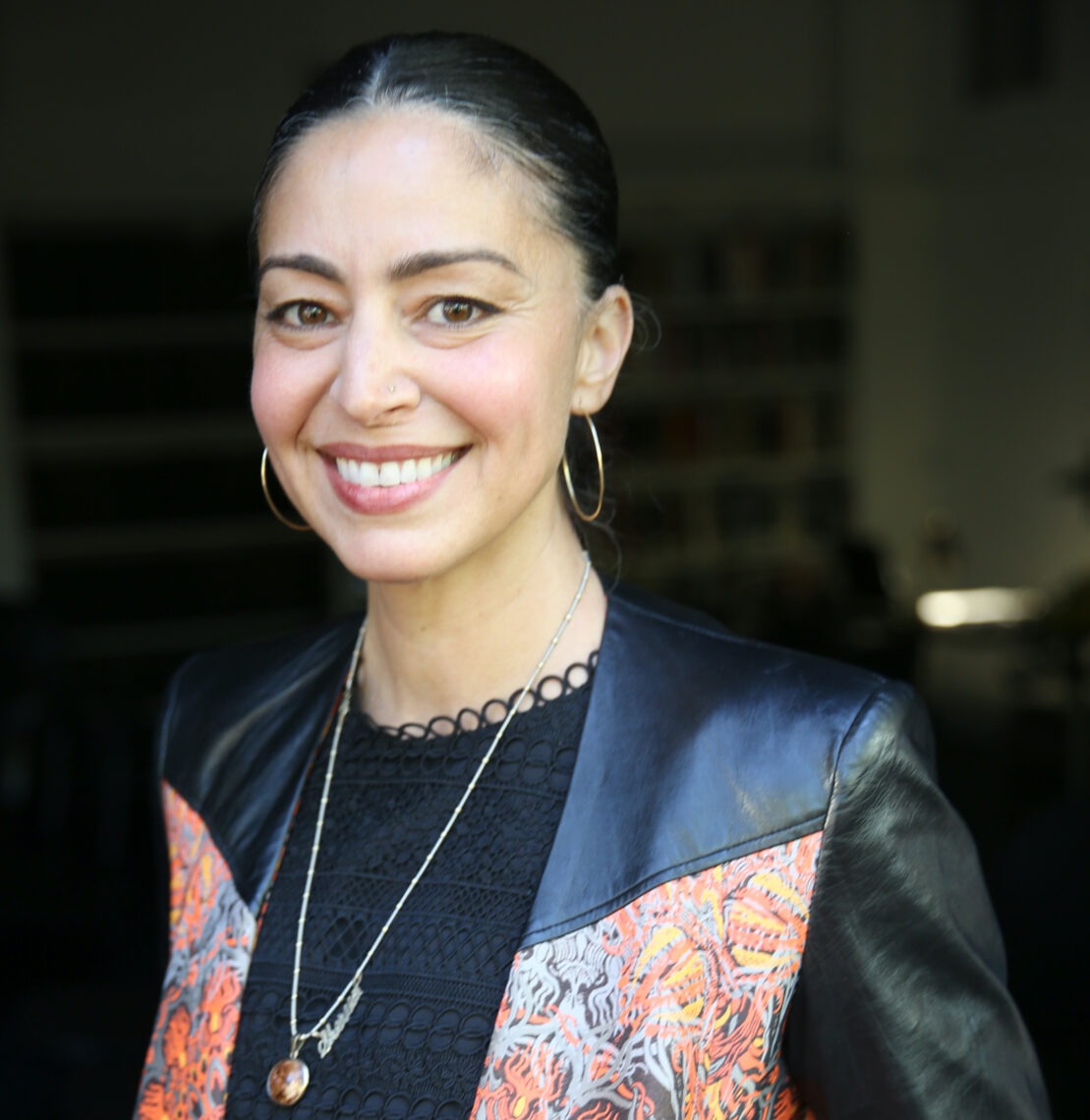
Shereen Marisol Meraji. Photo: Marlena Telvick
The two instructors selected by the students as speakers had practical advice. Shereen Marisol Meraji, who joined us last year after serving as co-host and senior producer of NPR’s “Code Switch,” urged students not to compare themselves to others and make friendships outside of their workplace. James Wheaton, the First Amendment attorney who has taught journalism law at our school for 20 years, asked the graduates to use their privilege to give back to their communities.
We honored two faculty members, Professor William Drummond and Professor Ken Light who are celebrating 40 years of teaching at our school. Two of Professor Drummond’s students, Byrhonda Lyons (’13) and Laurel Rosenhall (’02) made a special presentation about the key role he played in their careers. Wesaam Al-Badry (’20) spoke of Light’s continuing influence on his work.
Here are some of the highlights from our prolific journalism community. I share these knowing it is impossible for us to feature all of the accomplishments in this limited space, so I urge you to follow our social media channels to learn of our community’s important work and awards in real time. I also ask for your grace if I inadvertently leave out anyone or their important work.
Student News
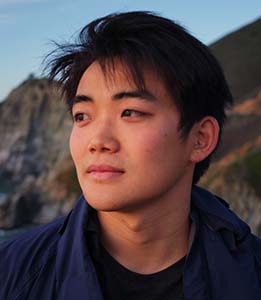
Kori Suzuki (’23). Photo: Semantha Norris (’23)
Kori Suzuki (’23) explored a little-known piece of Japanese-American history that aired on NPR’s “Code Switch” in May for AAPI heritage month. This was his thesis project.
Florence Middleton (’24) was named to the Pulitzer Center’s 2023 cohort of Reporting Fellows. Florence will document postpartum experiences, following a diverse group of women in the United States to tell a complex and intimate story about postpartum life.
Najim Rahim (’24) contributed reporting to “Stolen Valor: The U.S. Volunteers in Ukraine Who Lie, Waste and Bicker,” in The New York Times.
Sachi Kitajima Mulkey (’24) was named a 2023 Storyfest winner for her deeply reported and creatively presented story: “Reinventing a sustainable crab fishery.”
Lola Proctor‘s (’23) thesis project, “The Reality of Gender Affirming Care Bans Is a Terrifying One,” published in Teen Vogue.
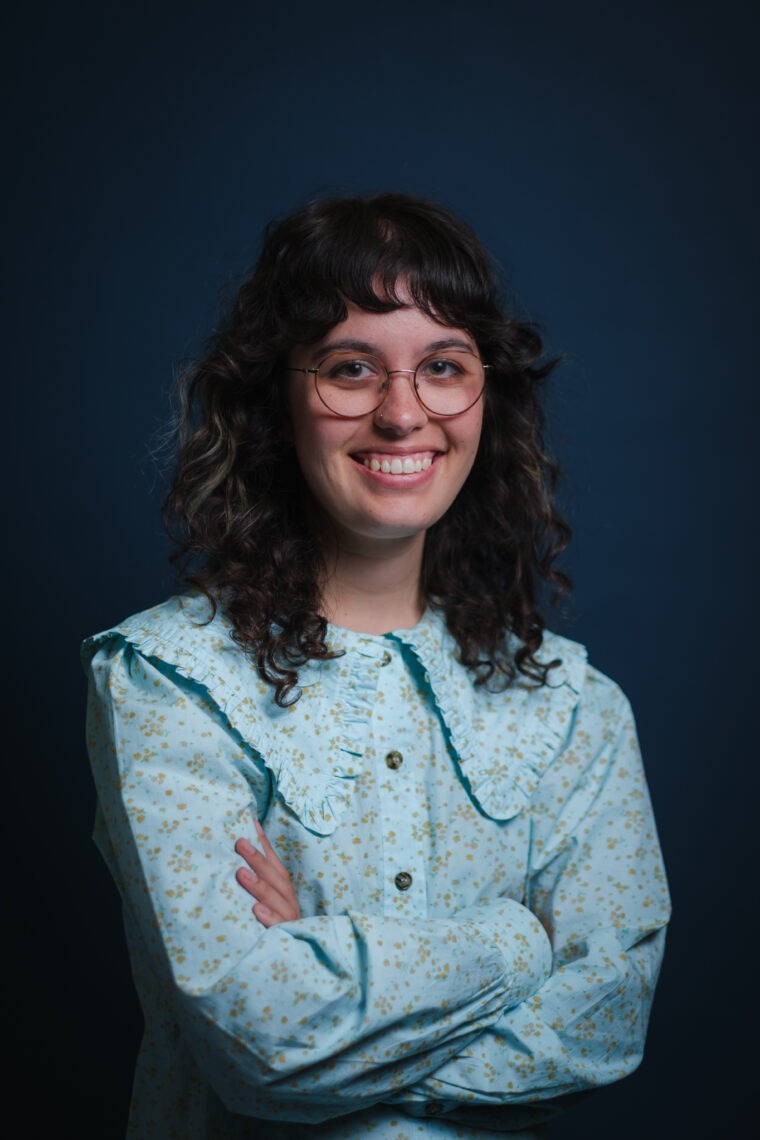
Lola Proctor (’23). Photo Kori Suzuki (’23).
Anabel Sosa‘s (’23) story and photographs “Weird Winter Put Bay Area Beekeepers to the Test” were published in The New York Times’ California Today newsletter.
Jeremiah O. Rhodes (’24) reported on long-term HIV survivors finding familial support in a unique San Francisco group home on 1A of The San Francisco Chronicle. Other stories in the IRP’s Aging in America series include: Kori Suzuki‘s (‘23) front-page Sunday story in The Sacramento Bee about how most seniors who qualify for food stamps aren’t getting them. Richard Tzul‘s (‘23) story about volunteer programs to help older people keep their pets, published on Connecticut Public media. Celeste Hamilton Dennis‘ (‘24) story in The Atlanta Journal Constitution about making houses of worship more welcoming for people with dementia. And Kate Raphael’s (’24) story about helping Sonoma County seniors age-in-place and prepare for wildfires, with photos by Isaac Ceja (’23), which was published on KRCB and KQED, and led to Kate being interviewed on KRCB News.
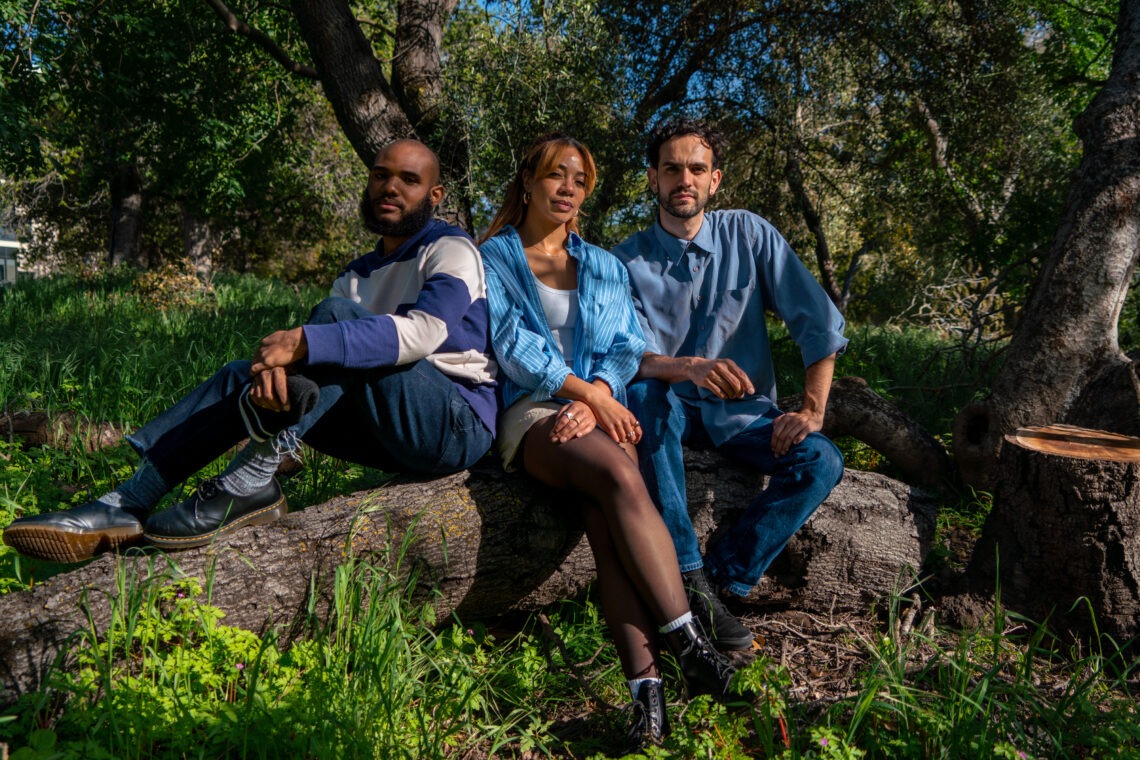
William Jenkins, Myah Overstreet and Alfredo Torres. Photo Katie Rodriguez (’23)
William Jenkins, Myah Overstreet and Alfredo Torres (’23) were awarded one of Berkeley Journalism’s top honors, the Marlon T. Riggs Fellowship in Documentary Filmmaking.
Krissy Waite (’23) reported in Sierra Magazine about the fight to save the Northern California Summer Steelhead from extinction through habitat restoration and federal and state intervention.
Kori Suzuki and Junyao Yang (’23) were named Rising With the Tides Fellows from Comcast, NBC Bay Area and the San Francisco Bay Area Chapter of the Asian American Journalists Association.
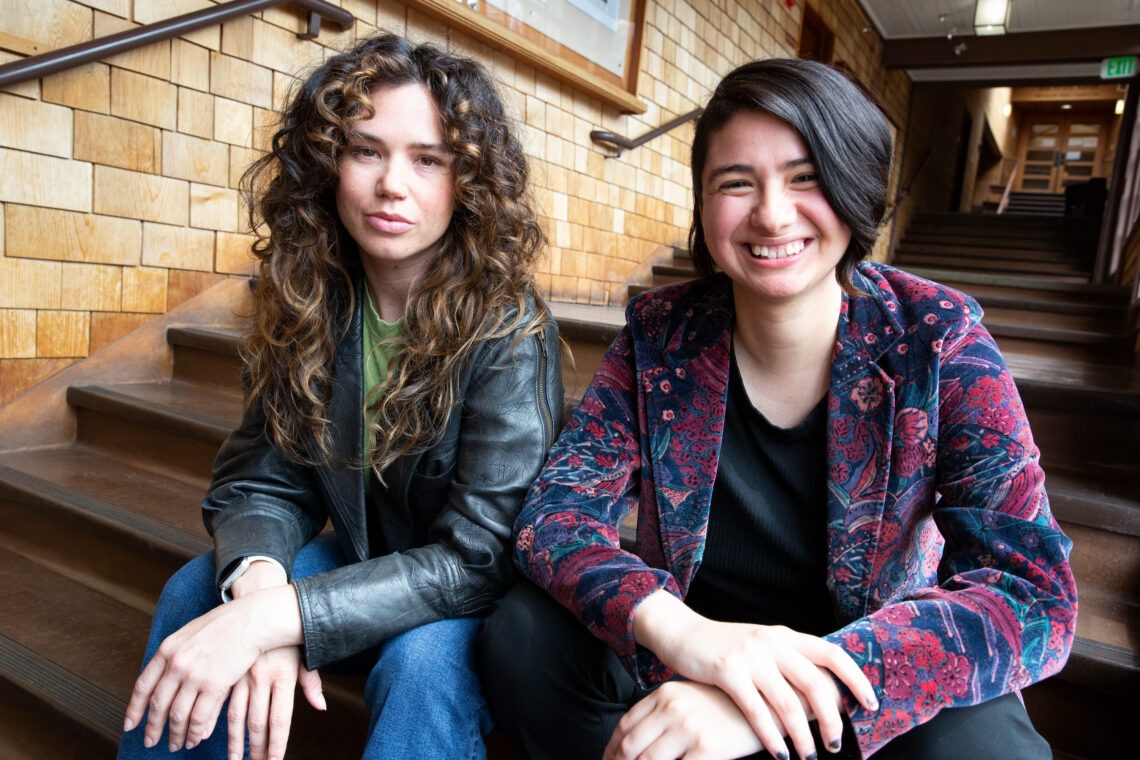
Holly Burns and Gisselle Medina.
Holly Burns and Gisselle Medina (’24) were awarded White House Correspondents’ Association scholarships. They were featured at a luncheon and program in their honor in Washington in April and were guests at the WHCA’s annual dinner, hosted by alum and advisory board member Tamara Keith (’01).
Chris (Yen-Chi) Chang (’23) was named an Overseas Press Club Scholar, and in other good news, is interning at Washington Post video this summer.
Juan Pablo Pérez-Burgos (’24) was named a 2023 Fellowships at Auschwitz for the Study of Professional Ethics (FASPE) Journalism Fellow. The Colombian writer and journalist covered transitional justice, conflict, environment, and politics in Colombia before moving to the United States.
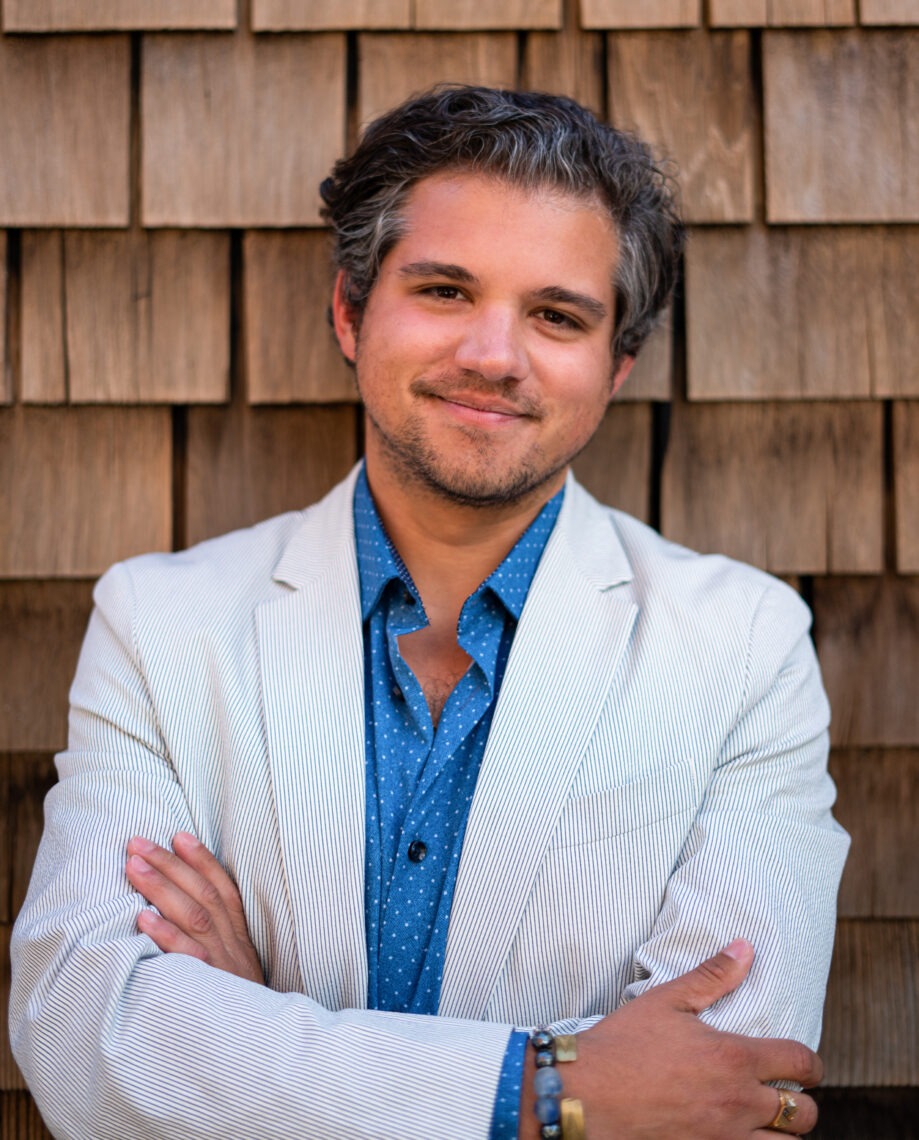
Chris Ehrmann (’23). Photo Katie Rodriguez (’23)
Chris Ehrmann (’23) was named to the inaugural class of the Moment Institute’s Middle East Fellows program. He will travel to Washington, D.C., to learn more about the Middle East region from veteran Middle East journalists, experts and analysts.
Zhe Wu (’23) and Wangyuxuan Xu (’23) were named Human Rights Center Fellows.
Faculty Publishing/Awards
Professor Ken Light celebrated the 20th issue of Real Eyes magazine, supported by the Reva & David Logan Foundation. He also published a full-page op-ed in The Washington Post featuring his archival photos, arguing we need more empathy for child laborers, and that those who work in oppressive conditions need photojournalists as witnesses. Light’s work is part of an exhibit at the St. Louis Museum of Art titled “New to the Museum: Prints, Drawings and Photographs” April 14-July 9. He also hosted the third Biennial Reva & David Logan Photo Book Symposium. You can watch recordings of the event on our YouTube channel.
Continuing lecturer Adam Hochschild’s latest book “American Midnight: The Great War, a Violent Peace, and Democracy’s Forgotten Crisis,” won the Gold Medal for Nonfiction at the California Book Awards. He also reviewed Hillsdale College’s 1776 Curriculum and a documentary series based on the 1619 Project, in The New York Review of Books, wrote about J. Edgar Hoover in The Nation, and was interviewed by The Nation podcast, “Start Making Sense.”
Professor and former Dean Edward Wasserman reported on a 1980s lawsuit that may now have profound implications for Gov. Ron DeSantis, in The Atlantic.
Professor Lisa Armstrong reported on a devastating story for The Texas Tribune about Joshua Keith Beasley Jr., a 16 year old who died by suicide in an adult prison. This was a follow up to a story she wrote about him last August to which Lola Proctor (’23) contributed reporting.
Lecturer Mark Schapiro of Capital & Main was named a finalist for best columnist from The Los Angeles Press Club’s SoCal Journalism Awards for “Steal This (Climate) Story,” a bi-monthly column examining the climate emergency through the lens of media coverage — what the press is doing well, where the gaps are and ideas for timely stories on the accelerating crisis.
Faculty Departure
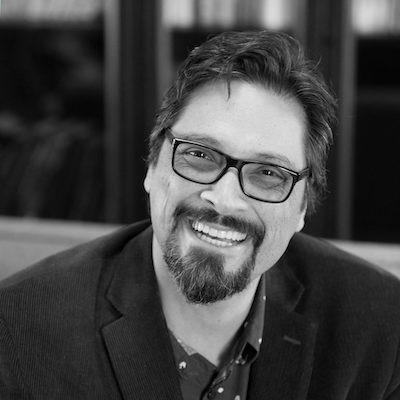
Richard Koci Hernandez
Professor Richard Koci Hernandez is stepping down from his storied career teaching, mentoring and inspiring our multimedia students. We will miss his dynamism, generosity and creativity that have helped define the culture of this school since he began teaching here in 2008. This is a huge loss for me and our school community, but I am happy for Koci who has some exciting new adventures planned.
Our Excelling Alumni
Serginho Roosblad (’18), video producer for the Associated Press, was on the team that won the Pulitzer Prize for Public Service for, “courageous reporting from the besieged city of Mariupol that bore witness to the slaughter of civilians in Russia’s invasion of Ukraine.” The stories included a video produced by Roosblad about a medic who captured exclusive bodycam footage while treating Ukrainian and Russian victims, including children, during the bloody siege of Mariupol. In the stuff of intelligence lore, a data card no bigger than a thumbnail was smuggled out inside a tampon, past 15 Russian checkpoints before the medic was captured by the Russians. Read the AP’s dramatic account of how the story came together here.
Melanie Mason (’10) and the staff of The Los Angeles Times won a Pulitzer for Breaking News reporting for revealing a secretly recorded conversation among city officials that included racist comments, followed by coverage of the rapidly resulting turmoil and pieces that delved further into the racial issues affecting local politics.
Greg Winter (’00) international managing editor and video journalist Yousur Al-Hlou (’14) were on the team at The New York Times that won the Pulitzer Prize for International Reporting for unflinching coverage of Russia’s invasion of Ukraine, including an eight-month investigation into Ukrainian deaths in the town of Bucha and the Russian unit responsible for the killings. Winter edited the largest story in the Pulitzer-winning package, called “Putin’s War” and did some other editing in the package as well. Read Al-Hlou’s reaction to the win here.
Nick Miroff (’06) appeared on five of the bylines of a Washington Post seven-part investigation into fentanyl’s deadly surge, which was named a Pulitzer finalist in Public Service for showing how government failures aggravated the worst drug crisis in American history.
Joaquin Palomino (’15), a data and investigative reporter for the San Francisco Chronicle, was named a Pulitzer finalist for “Broken Homes,” which detailed how the San Francisco mayor’s administration failed to properly staff and oversee the century-old single room occupancy hotels, or SROs, that it relies on to house homeless people, allowing the buildings to become overrun by chaos.
Violet Feng‘s (’04) directorial debut, “Hidden Letters,” about Nüshu — an ancient, secret, women-only language originating in China — was shortlisted for the Oscars in the Documentary Feature Film category. Clare Major (’10) was cinematographer on “Holding Moses,” shortlisted for Best Documentary Short Film.
Cynthia Dizikes (’08), an investigative reporter at the San Francisco Chronicle, won an IRE Award for “Child deaths at John Muir Health.” Joaquin Palomino (’15), also of the Chronicle, won an IRE Award for “Broken Homes.”
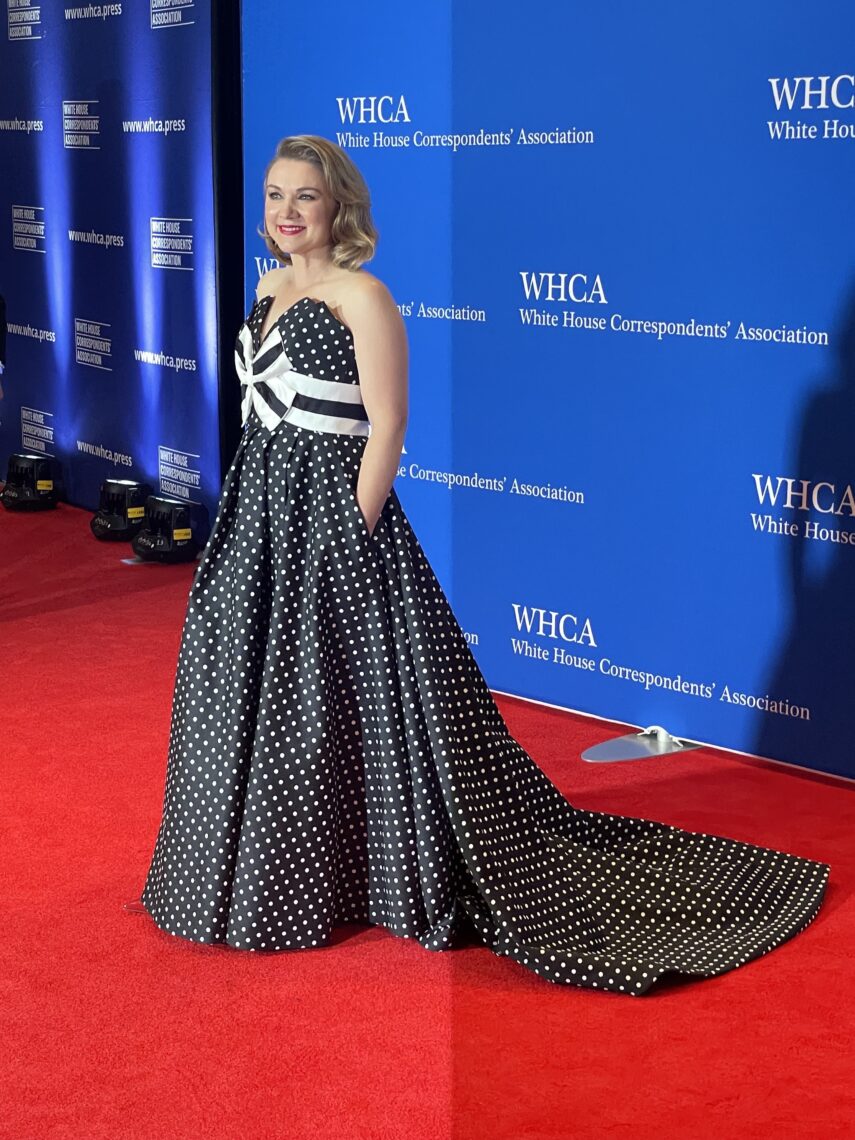
NPR’s Tamara Keith (’01) on the red carpet at the White House Correspondents’ Association Dinner on April 29th. The dress was inspired by the one Holly Hunter’s character wore to attend the dinner in the legendary journalism film Broadcast News. Keith is the current president of the association.
Jess Alvarenga (’20) contributed field reporting to a powerful year-long investigation, “Death by Policy: Crisis In The Arizona Desert,” for Futuro Investigates at LATINO USA that won the IRE award for best large audio.
Alvarenga and Shaina Shealy (’16) were also selected for the 2023 cohort of Tim Ferriss – UC Berkeley Psychedelic Journalism Fellows.
Miki Katoni‘s (’20) documentary short “It’s Still an Emergency: The Vulnerability of Queer Orthodox Jews” ran in The New York Times Opinion Video. The beautifully filmed project on conversion therapy in the Orthodox Jewish community of Crown Heights was originally shot at the beginning of his last semester for a short form video project but sidelined due to the COVID-19 pandemic. Classmate James Tensuan (’20) edited the piece in 2022 and was on the original shoot to capture field sound.
Brett Murphy (’16), a reporter at ProPublica, was awarded a Polk Award for his stunning investigation of a 911 call analysis training program that led hundreds of police officers, prosecutors, coroners and dispatchers nationwide to divine guilt and innocence from the word choice, cadence and grammar of people reporting emergencies.
Documentary films by six alumni screened at the San Francisco International Film Festival in April. Pete Nicks (’99), Sean Havey (’14) and Gaby Arvizu’s (’16) film “Underrated,” featuring the breakout story of NBA superstar Stephen Curry, kicked off the 66th SFFILM Festival. Also screening were Débora Souza Silva’s (’14) “Sol in the Garden,” about a formerly incarcerated woman nourishing a garden with her new community, and Christian Lee Collins’ (’20) “What These Walls Won’t Hold.” Nicks (’99) is executive producer. Faviola Leyva‘s (’16) “Blood, Sweat & Sparkles: The Young Activists Guide to Ending Period Poverty,” screened as part of SFFILM’s Schools at the Festival hybrid program.
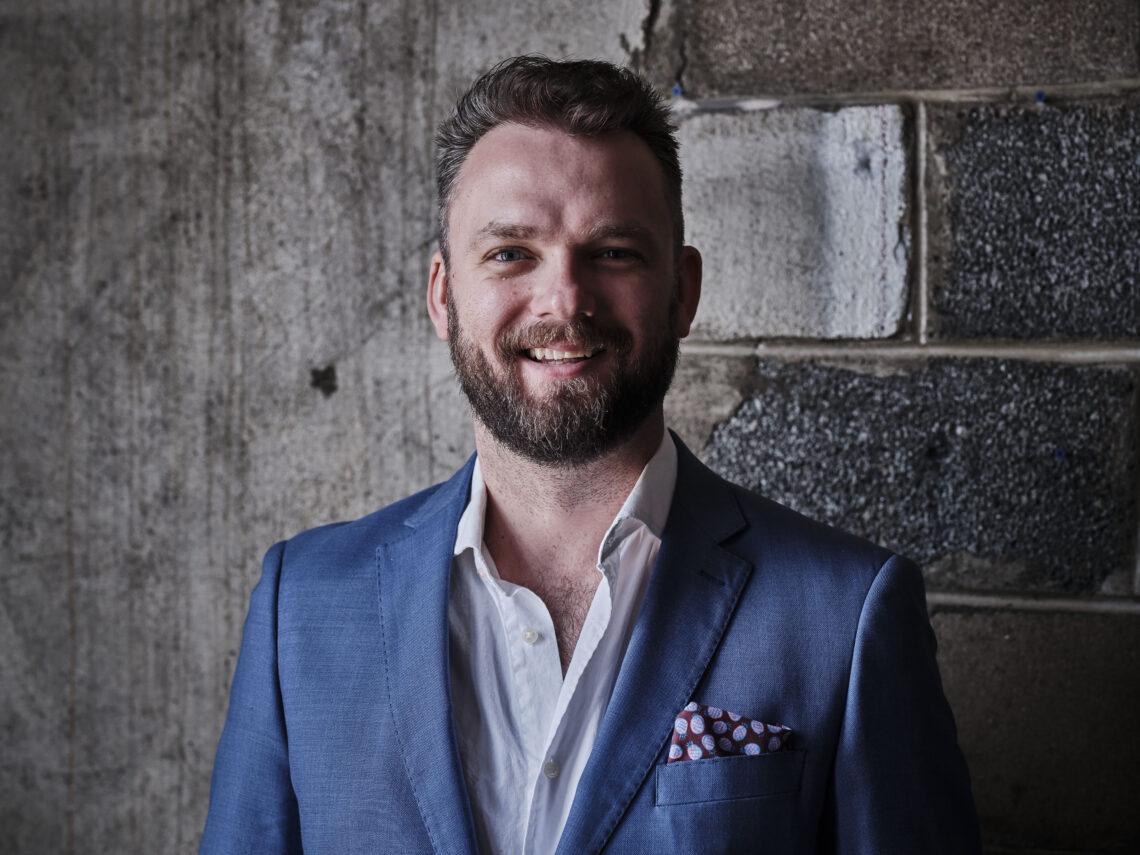
Mark Kurlyandchik (’15)
Mark Kurlyandchik‘s (’15) documentary, “Coldwater Kitchen,” about a chef who has run a fine dining culinary arts program inside a Michigan prison for nearly 40 years, won a 2023 James Beard Award.
Laurence Du Sault (’20) of Open Vallejo was named a semi-finalist for the Goldsmith Prize for Investigative Reporting. “City of Impunity” was produced in partnership with ProPublica’s Local Reporting Network as part of her fellowship. She was also one of 26 women selected for the 2023 Women’s Leadership Accelerator from the Online News Association.
Kate Elston (’13), senior producer for Direct From at AJ+ was awarded a Peabody Award for “One Day in Hebron,” which chronicled the discrimination Palestinians endure at the hands of Israeli settlers. Some 1.8 million people have watched this film on YouTube.
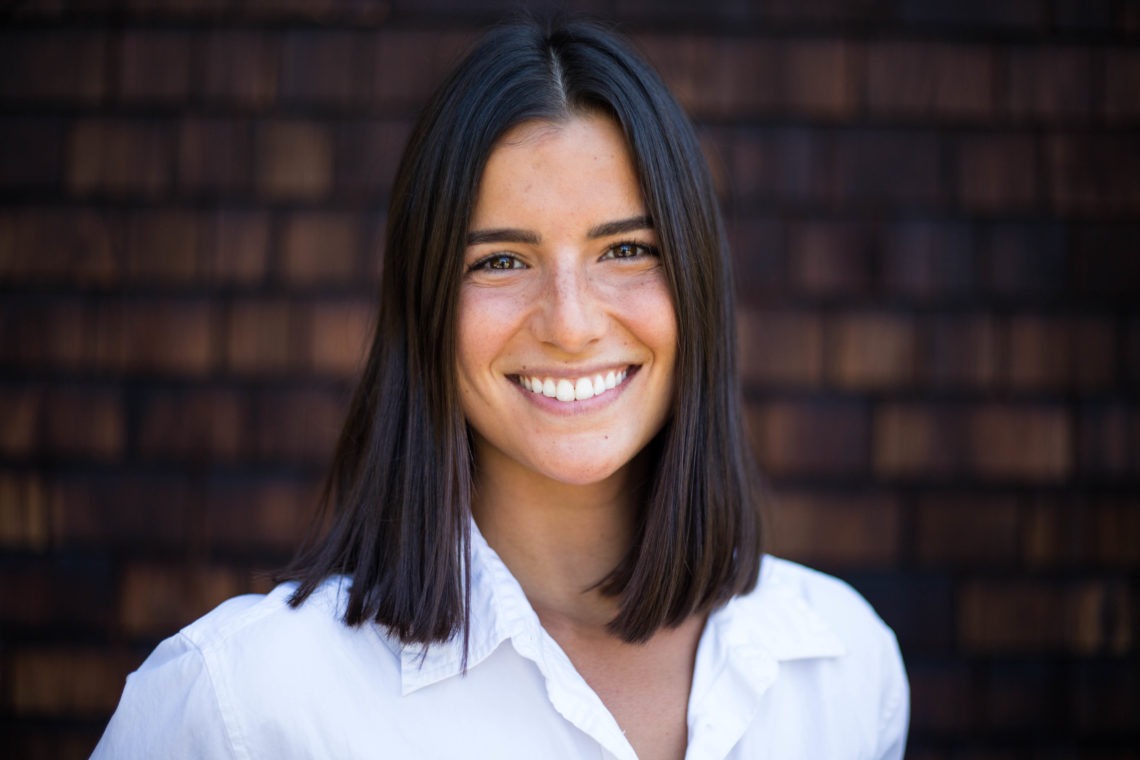
Laurence Du Sault (’20)
Carl Nasman (’12), who for the past eight years was a reporter and anchor at Deutsche Welle, Germany’s international broadcaster, and global correspondent with NBC News based in London, has joined the BBC News team in Washington, D.C., as a senior journalist.
Sam Green’s (’93) latest film, “32 SOUNDS,” opened in theaters around the country following its premiere at Sundance in 2022 and had a several week run at the Film Forum in New York in May. Rolling Stone called it, “the greatest documentary you’ve ever heard.”
Advisory board member and former lecturer Carrie Lozano (’05) has joined ITVS as president and CEO. She had served as director of Documentary Film and Artist Programs at the Sundance Institute.
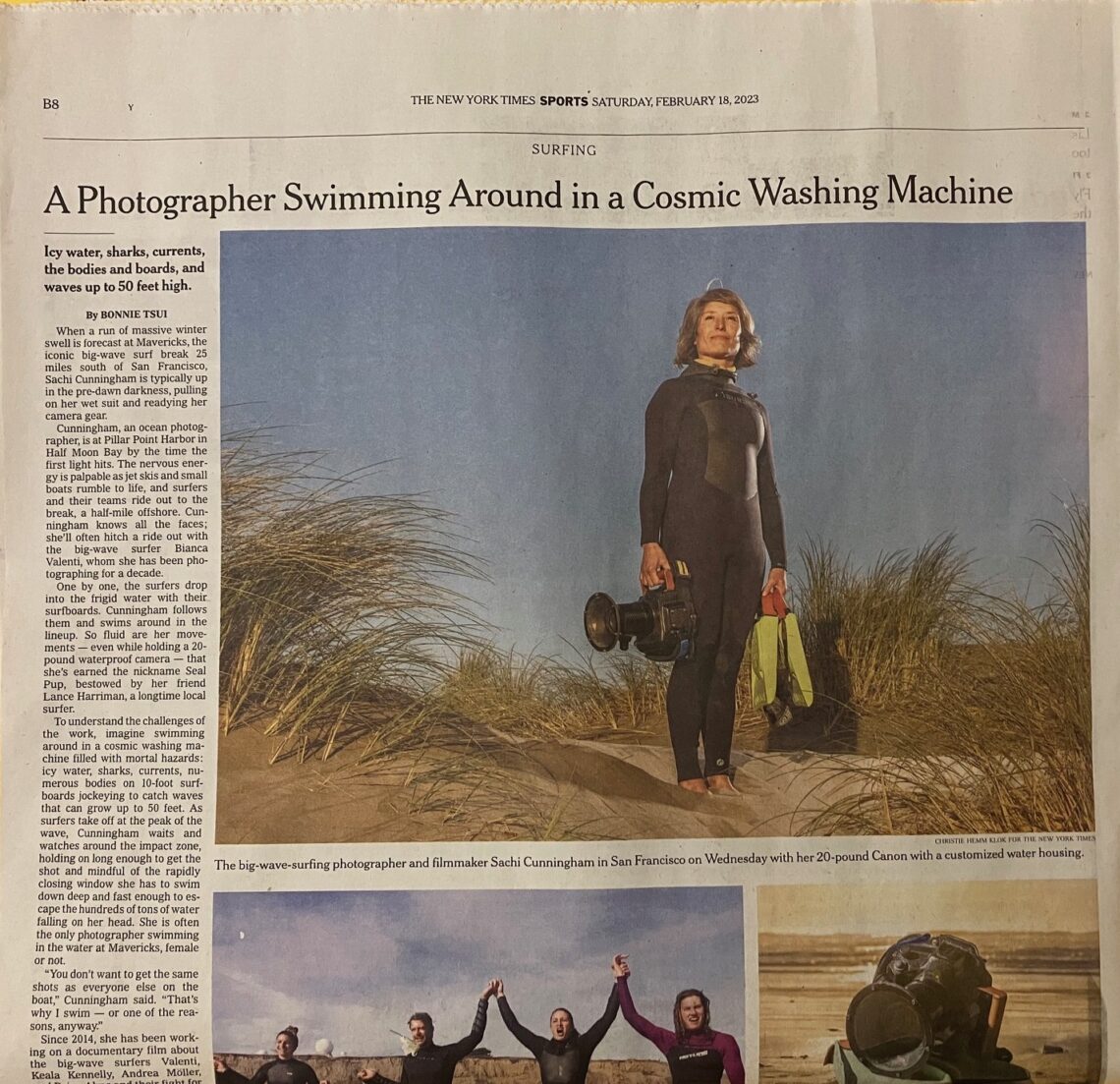
Sachi Cunningham (’05) was profiled not once, but twice recently in national media outlets: The New York Times and on the Today Show. She is currently at work on, “SheChange,” a feature documentary film that follows the best female surfers in the world as they fight for gender equality in one of the most dangerous sports on earth. Cunningham’s work as an ocean photographer and her courageous life story make us all proud of her vision and perseverance.
Mark Oltmanns‘ (’12) first feature documentary, “Riders on the Storm,” was an official selection for the documentary competition at SXSW 2023, where it had its world premiere.
Jessi Hempel‘s (’03) new book, “The Family Outing: A Memoir,” about one family’s transformation, with almost all of them embracing their queer identities, is available now.
Two-time Pulitzer Prize-winner Alexandra Berzon (’06) was a reporter on the PBS Frontline/ProPublica documentary “Plot to Overturn the Election,” which won the 2023 Walter Cronkite Award for best documentary. It traced the hidden sources of misinformation about the 2020 election, demonstrating how a handful of people have had an outsized impact on the current U.S. crisis of democratic legitimacy. Marjorie McAfee (’06) won the Walter Cronkite Award for TV Journalism for the “Impact x Nightline” episode “Threat to Democracy.”
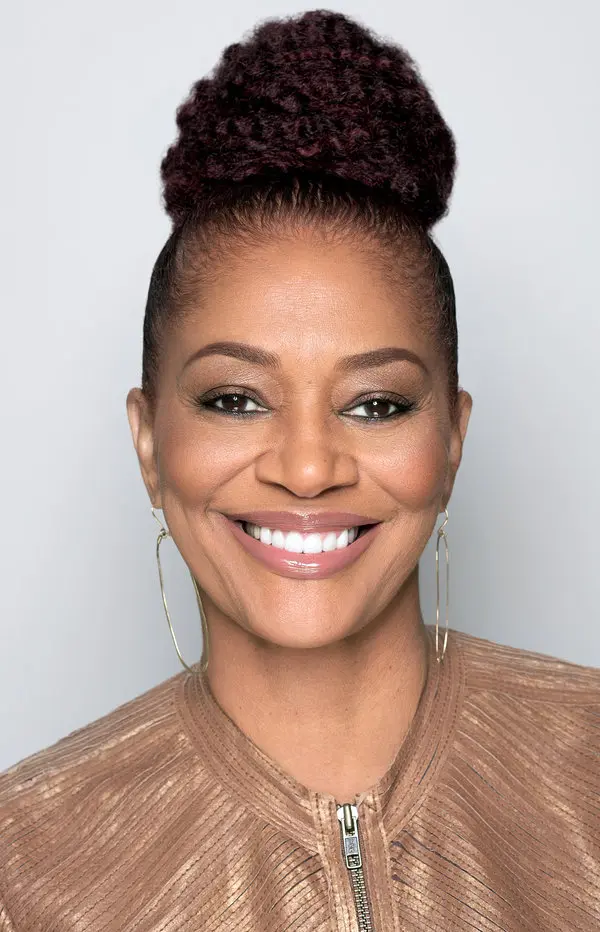
Terry McMillan
Best-selling author Terry McMillan (BA ‘77) gave an inspiring commencement speech at UC Santa Barbara’s Humanities & Fine Arts Commencement Ceremony in June. Watch it here.
Steven Leckart‘s (’07) “Legacy: The True Story of the LA Lakers,” a 10-part series on Hulu, won a Sports Emmy Award for Outstanding Documentary Series. Leckart wrote and executive produced the series and Bo Kovitz (’19) was a story producer.
When he was a child, artist and photographer Wesaam Al-Badry‘s (’20) family fled his home country of Iraq at the onset of the Gulf War. That experience has sculpted much of his extraordinary work, which focuses on capturing human struggle with dignity and love. Don’t miss this look at one of the most unique and creative minds coming out of the School in recent years, on the PBS “NewsHour”.
Gabriela Quirós (’98), video producer and the coordinating producer for KQED’s web science video series “Deep Look,” won the gold medal for video spot news/feature reporting in the 2022 AAAS Kavli Science Journalism Awards.
Garance Burke (’04) led the cross-border, cross-format team that produced “Tracked,” a series by The Associated Press that revealed the impacts of artificial intelligence tools in our communities amid a year of pandemic and protests, which won the National Headliner Awards first prize for Public Service. Burke is a former J-School lecturer, and there are other Berkeley connections to the series. Advisory board member Ron Nixon edited the series, alum Serginho Roosblad (’18) was among the 40 plus journalists who contributed to it, and UC Berkeley’s Human Rights Center Investigations Lab and Berkeley Law were key partners.
Alix Christie (’86) has a new deeply researched and reported historical novel out — “The Shining Mountains” — about the long-forgotten multicultural history of the West, and recently won a Pushcart Prize for her story, “Everychild,” in The Missouri Review. She keeps her hand in journalism writing about culture for The Economist from her base in San Francisco.
Derêka Kay Bennett‘s (’22) short film, “A Terrorist or a Cry for Help,” for the Dallas Morning News recently won two awards at The Independent Short Awards — a bronze award for best student female director, and an honorable mention for best short documentary. Derêka was also nominated for best student female director at the Indie Short Fest in Los Angeles. The film follows a rapid police escalation after former Arizona State University football player Robbie Robinson, who is Black, tweeted about “tyrannical” playing conditions under a new coach.
Writer, historian and activist Rebecca Solnit‘s (’84) “Not Too Late: Changing the Climate Story from Despair to Possibility,” is available now.
Madeleine Bair (’11), founder of El Tímpano, was awarded the Silver Heart, honoring “extraordinary dedication to amplifying unheard voices and sharing stories from marginalized communities” at the SPJ NorCal Excellence in Journalism Awards.
Other winners at the SPJ awards included Imran Malik (’22) and Jeb Sharp (’90) of KALW for best podcast journalism for “Becoming Muslim,” a series of portraits of Bay Area residents who converted to Islam.
Andrew Gilbert (’98) of Mission Local also won an SPJ award for coverage of the music scene in San Francisco’s Mission District.
Laura Klivans (’16) of KQED received an SPJ award for her work on racism in highway emissions policies.
Raquel Maria Dillon (’07) of KQED was honored by SPJ for her work about the fatigue faced by professionals fighting wildfire.
Also at the SPJ awards, Vanessa Rancaño (’14) of KQED won an award for “What’s a Black School Worth in Oakland?”.
Sasha Khokha (’04), Izzy Bloom (’22) and Victoria Mauleon (’01) of KQED were also honored by SPJ for, “Meet Three of the Women Behind an Indigenous Land Back Effort to Reclaim an SF Peninsula Farm.”
Brian Krans (’18) of the Vallejo Sun received an SPJ honor for, “Left Alone in Their Rooms: Death and dysfunction in Vallejo’s COVID housing for the homeless.” Krans also won an SPJ award for his reporting on how badge bending became a ritual among Vallejo police.
Spencer Whitney (’13) of KQED was honored by SPJ for “Remembering Russell City: A Thriving East Bay Town Razed by Racist Government.”
SPJ also honored Kelly Whalen (’01) of KQED for “When the Waters Get Deep.”
Tyche Hendricks (’96) of KQED received an SPJ honor for reporting on how asylum seekers in California struggle to navigate a dysfunctional immigration court system.
SPJ also honored Sonia Narang (’08) of KALW for her series “What Works: Grassroots Solutions Around the Bay.”
April Dembosky (’08) of KQED received an SPJ award for her reporting on how schizophrenia puts people at risk of dying from COVID-19.
Rachael Myrow (’95) of KQED received an award for, “Incorrectly Deleted From Facebook? Getting Back On Might Take Connections.”
We’ve created a new section on our J-School website where we interview alumni doing some really interesting work. Irene Benedicto (’23) recently interviewed alum Lucas Waldron (’17), graphics editor at ProPublica. Lola Proctor (’23) interviewed Lisa Pickoff-White (’09), who is at the forefront of the industry as the first and only full-time data journalist at KQED News with a focus on investigative reporting.
News From Our Investigative Reporting Program (IRP)
In April, the IRP hosted the 15th Annual Reva & David Logan Symposium on Investigative Journalism at UC Berkeley.
The sold-out event featured panels on prosecuting whistleblowers/criminalizing journalism, exposing violence against trans and non-binary people, and investigating the U.S. Supreme Court.
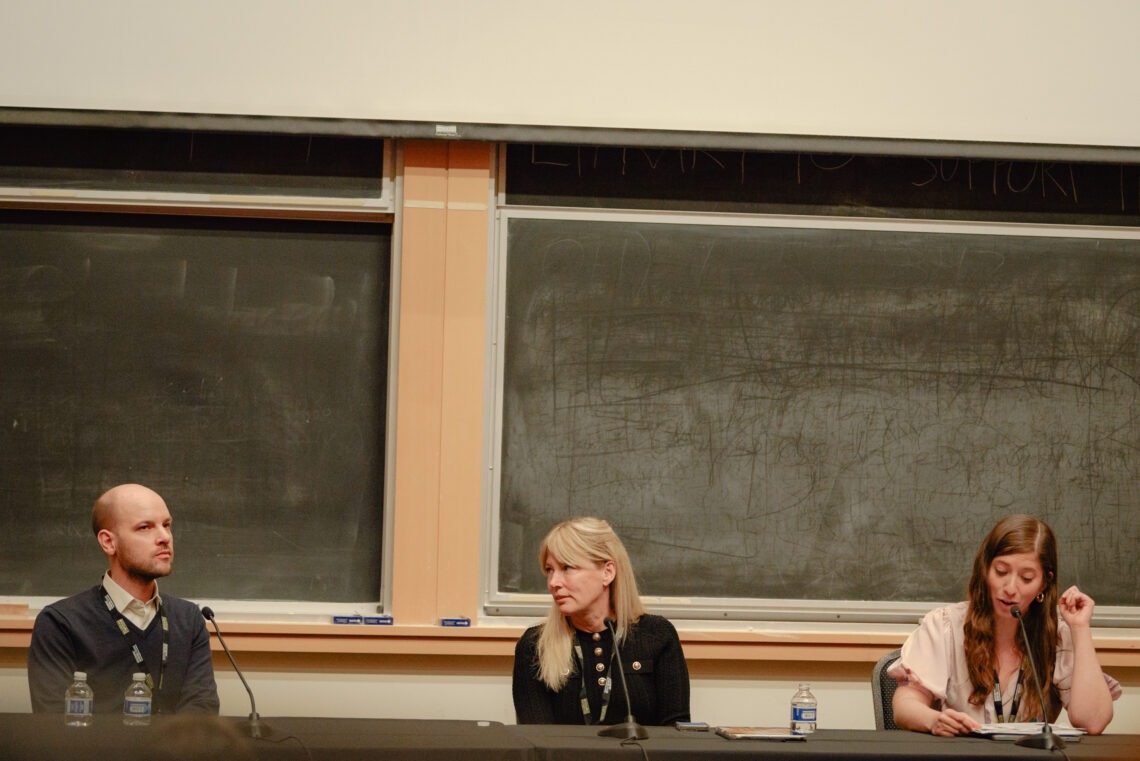
Logan Symposium Panel: All Rise | Holding the High Court Accountable. From left to right: Justin Elliott (ProPublica), Jo Becker (The New York Times) and Julia Longoria (Host of More Perfect, from WNYC) CREDIT: Kori Suzuki (’23) for the Investigative Reporting Program
After a panel featuring Daniel Ellsberg, our advisory board member, and fellow whistleblower Reality Winner, Professor David Barstow, chair of the IRP, announced the creation of the week-long Daniel Ellsberg Whistleblower in Residence program. The goal is to foster a long-overdue conversation about how to strengthen bonds between journalists and whistleblowers.
We hope to spur journalists to look critically at how we treat whistleblowers and to explore best practices in the way whistleblowers are protected by news organizations. We also think it is critical for our students to hear directly from whistleblowers so that they are better prepared to navigate these often complex source relationships.
With inaugural support from the Reva & David Logan Foundation, each spring, we will invite a whistleblower to spend a week with us at Berkeley Journalism, meeting with students, visiting classes and speaking at the annual Logan Symposium.
The Symposium closed with a keynote conversation between Nobel Peace Prize winner and Rappler co-founder Maria Ressa and Raney Aronson-Rath, the editor-in-chief and executive producer of PBS “Frontline.” Professor Lisa Armstrong, continuing lecturer Adam Hochschild, Professor Edward Wasserman and myself spoke or moderated panels at the event.
IRP alums Meg Shutzer (’20) and Rachel Lauren Mueller (’20) were named finalists for the Livingston Awards, which honors the best reporting by journalists under the age of 35, for their story about repeated abuses at a Louisiana juvenile facility. The investigation was shepherded for two years by Professor David Barstow and published by The New York Times in a front-page story that jumped to four full pages inside.
In March, two new IRP-supported investigations were published in The San Jose Mercury News and The Los Angeles Times:
• Bella Arnold (’24) and Krissy Waite (’23) worked with Lisa Pickoff White (’09) to report “Amid FBI investigation, Antioch police refuse to release use of force records, including a controversial neck hold that has since been widely banned,” San Jose Mercury News.
• “After police killings, families are kept in the dark and grilled for information,” Los Angeles Times, by Brian Howey (’22).
And a 2022 IRP story by Arijit Sen (’22) and Derêka Bennett (’22), which ran in The Dallas Morning News, exposed universities’ use of a high-tech tool to spy on students, prompting the University of North Carolina to drop the tool and sparking investigations at 11 universities in seven states.
IRP reporter Kathryn Hurd’s (’21) investigation about hundreds of children being housed in hotels across L.A. due to one of the most profound shortages of foster care homes in memory, published on 1A of The Los Angeles Times.
IRP staff and reporters also have received a number of grants and fellowships to support their investigations. Managing editor Bernice Yeung received a McGraw Fellowship for Business Journalism for a story on human trafficking that’s being done in collaboration with the International Consortium of Investigative Journalists. The Fund for Investigative Journalism is providing financial support to an investigation of the child welfare system by IRP reporters Garrett Therolf, Daniel Lempres (’21), Kathryn Hurd (’21) and Ellie Lightfoot (’21). FIJ is also helping to fund a story by Katey Rusch (’20). IRP reporter Gisela Pérez de Acha (’20) was selected as a 2023 Pulitzer Center Rainforest Investigations Network fellow. And IRP reporter-in-residence Yasmin Rafiei received the Tarbell Fellowship for early-career journalists “intent on improving the world.” She is currently investigating domestic homicide through an Ida B. Wells Fellowship.
Event News
Our stellar director of career development, Betsy Rate, brought in a stunning group of recruiters to interview students in April at our fourth annual Media Mayhem virtual career fair and networking event. These recruiters included folks from The New Yorker to KQED, The Dallas Morning News to The Los Angeles Times, The New York Times to Bloomberg, the Mississippi Center for Investigative Reporting, Mother Jones, Slate podcasts, The Wall Street Journal, The Washington Post, and many newsrooms across California as well as documentary film production companies. As a professional school, this is how you hit it out of the park for your students.
Our seventh annual Bloomberg-UNC-Berkeley Business Journalism Diversity Program, an intensive, five-day business journalism workshop, was held mid-May in New York City. The program has given more than 50 students from diverse backgrounds the opportunity to learn the fundamentals of business journalism. It also serves as a pipeline to recruit promising students of color to our school. Read about this year’s cohort, 24 students representing 18 universities in the United States, here.
Over a dozen alumni joined hosts Professor Jennifer Redfearn, Jigar Mehta (’05) and Duc Bieu Pham (BS ’02) at the “Cal @ Sundance” event at the Sundance Film Festival in Park City, Utah, in February. Pete Nicks (’99) and his co-creators Sean Havey (’14) and Gaby Arvizu (’16) screened “Underrated,” and reporter and producer Rae de Leon (’14) premiered her documentary, “Victim/Suspect,” about police charging self-reporting sexual assault and rape victims with a crime. The film appeared on Netflix’s top 10 most watched list for weeks after it launched in May.
We’re increasingly posting videos of our events to our YouTube channel so more of you can watch from the comfort of home. Sign-up for our events mailing list here.
If you missed the extraordinary Pulitzer Center-sponsored conversation “Fighting for Women’s Rights: Afghanistan and Iran,” we invite you to watch it. Held in March at our school, the event featured PBS “NewsHour” correspondent Jane Ferguson, Rukhshana Media founder Zahra Joya, reporter and senior editor for NPR’s Morning Edition Arezou Rezvani and myself discussing women’s rights in Afghanistan and Iran.
We also hosted another important conversation, “Reporting in the Undocumented Community: Consent, Mental Health, and Trauma.” It featured alum and lecturer Daffodil Altan (’04) with lecturer Monica Campbell; KQED labor correspondent Farida Jhabvala Romero; Bianca Barrios, Undocumented Students Program staff psychologist at UC Berkeley; and Professor Andrés Cediel (’04).
If you missed the Journalists Association for Mental Health chapter’s thought-provoking workshop on covering mental illness held in April and moderated by Grace Galletti (’23), it’s available now.
We also hosted the third annual Chris Boskin Deans’ Speaker Series in Business and Journalism with Berkeley Haas for a conversation between Jann Wenner, founder and editor of Rolling Stone, and Greil Marcus, journalist, historian, and music critic. You can watch it here.
Professor Lisa Armstrong interviewed W. Kamau Bell in April as part of the university’s Becoming an Anti-Racist Campus (BAAC) work, encouraging all members of our community to share a collective responsibility to recognize, confront, and uproot both individual and systemic forms of racism as a core institutional value.
Upcoming Events to Note
Please save the date for the Berkeley Journalism at Homecoming alumni weekend at North Gate Hall October 6 to 8. All graduates are invited to attend. More details will be coming later this summer. If you are interested in volunteering, please contact Lia Swindle, who joined us last fall to lead alumni affairs and external events.
Vital Support for Afghan Refugees
We have been working hard to find ways to overcome the economic barriers that our students face in attending graduate school at Berkeley Journalism, which is why I’m particularly thrilled to let you know that Khwaga Ghani (’24) and Najim Rahim (’24) have both been awarded the Afghan Challenge Fund Fellowship, from the Threatened Scholars Initiative of the Open Society University Network.
The fellowships, which will provide $40,000 towards their second-year expenses, are awarded to newly arrived Afghans such as Najim and Khwaga whose work in Afghanistan placed them in critical danger, and who, given the opportunity, will make valuable contributions to the future of their country and society.
Najim, Khwaga, and their families had been forced to leave Afghanistan following the Taliban’s seizure of power, and to leave behind successful careers as professional journalists — Najim working for the Kabul bureau of The New York Times, and Khwaga for NPR’s South Asian reporting team.
An education at Berkeley Journalism offers them the opportunity to deepen their professional expertise and reboot their careers. Early contributions from The John D. and Catherine T. MacArthur Foundation, the Shelby and Fred Gans Foundation, Simone Coxe, Emeritus Professor Joan Bieder, and the Lorber Family Foundation helped get them started here. Now, with the Afghan Challenge Fund Fellowship and continuing support from Simone Coxe, they can finish what they started.
In Conclusion
Berkeley Journalism is committed to recruiting and training the next generation of truth-seeking, fact-based journalists to become exceptional storytellers and industry leaders. The scope of our vision is expansive and requires the investment of each and every one of us. Will you stand passionately with us by making a tax-deductible donation today?
Wishing you and yours a safe and restorative summer ahead,
![]()
Geeta Anand
Dean and Professor
Robert A. Peck Chair
Berkeley Journalism
About this communique: The Dean’s Letter is a quarterly email newsletter sent to alumni, donors, students, faculty, media partners and others in Berkeley Journalism’s broad community. If you’d like to follow ongoing developments in real-time, find us on Facebook, Twitter, LinkedIn and Instagram. Have alumni news or accomplishments to share? Please send it, along with a high-res headshot to journalism@berkeley.edu. Are you hiring? Please reach out to career.services@berkeley.edu. Want to learn more about donating to the school? Contact stevekatz@berkeley.edu.
